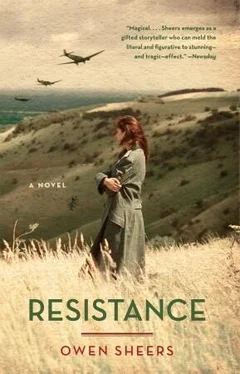The pattern of the music changed, the stab of a sudden high note rising through a smooth flow of the other phrases. The surprise of it picked at Sarah’s heart and she found herself suddenly looking up at Albrecht. She was met with the top of his bowed head over his folded arms. Standing there like that he looked like a body prepared for the coffin.
The bow was moving quickly over the strings now, building rapid ascents before falling back to the familiar foundation of that single bass note. Sarah remained motionless at the table, but inside her mind was racing after those notes. It had been so quiet. So silent. And now this. So much sound, so intricate and yet so simple. The weight of the winter months seemed to collapse about her, undermined by this music like the blocks of snow along the banks of the Olchon, weakened and loosened by the river’s renewed energy.
The first movement came to an end with a return to the original phrasing, closing not with the single bass string that Sarah unconsciously anticipated, but with a smoother, longer note, drawn out to a sudden silence. The stylus hissed and popped in the record’s grooves, riding the slight waves of its surface like a boat anchored out at sea. The wind outside seemed amplified and a blackbird’s song rang through the yard, as if all the sound about them had been washed clean in the cello’s music.
“The Allemande,” Albrecht said barely audibly, his head still bowed. Sarah didn’t understand, but again he appeared to conjure the music, as with these words it began once more, lighter, faster, with contralto vibrations at its heart.
Again Sarah and Albrecht remained motionless as the battered gramophone filled the room with its music; Sarah seated at her table, pockmarked and scored by generations of hungry farmers, and Albrecht standing at the window, the coldness of the wind penetrating the panes at his back, his eyes closed and his inward vision travelling back to distant concerts with Ebbe before the war.
At the end of the second movement he spoke again, even quieter than before, “The Courante.”
Again they listened, and Sarah too found herself transported, not to a faraway past but to her present. In all the months of silence, she hadn’t been able to think, to once make sense of things, to see clearly. Now, with her kitchen filled with more sound than it had ever heard, she found a silence in which to think, a cavern of reflection carved from the notes piling and crowding about her.
The end of the Courante caught her unawares, a series of foreshortened ascents that slipped back, once more, to that bass string, trembling the breadcrumbs beside her fingers.
Albrecht, however, had been ready. She turned her head to see him standing over the gramophone, his hands poised on either side of the revolving record as if he would pounce and catch the final dying note before it slipped into silence. He did not, and waited instead until its faintest resonance had passed before raising the stylus from the disc with one finger, as he might the chin of a crying girl. Swinging the arm to one side he flipped the record, wound the crank, and lowered the needle again, all in what looked like one swift movement.
“The Sarabande,” he said, not looking at her as he took up his position by the window again. There was something in the way he said this, a promise in his tone, that made Sarah strain to catch the first note from the record’s initial grooves of empty static.
When it came she understood. Languid, slow, pregnant with sorrow, the strings seemed to belong to another instrument altogether. A regretful but wise and saddened cousin of the cello that had played the first three movements. Sarah found her own head dropping now and her eyes closing. It was beautiful but she could not bear it. The music seemed to know. About her hours on the hillside, the wind like the sound of her own blood in her ears, the long nights lying awake in her abandoned bed. It was as if the notes of her heart over these past three months had been dictated directly to the hand that drew this bow over these strings to describe, so perfectly, the complex yet simple geometry of her damaged soul.
The movement closed, not as the others had with definite strokes across a string, but with the lightest of touches, almost accidental, the contact so slight that the final note barely breathed from the string before extinguishing, leaving a resonance of more substance than the note itself.
The gramophone hissed. The wind shivered the panes of the window. “The Intermezzo,” Albrecht said in a whisper, “a bourrée.”
Again on cue the music began, played once more by the first cello, a succession of rapid, tilting phrases. But Sarah was still listening to the Sarabande, its echo running under everything she heard in this movement and in the final Gigue, which made an inevitable return to the patterns of the Prelude.
The suite played itself out as it had begun, with a strong pass across a deep bass note that left its imprint on the air as physical and real as if a pebble had dented the atmosphere of the farmhouse kitchen. The needle ran to the end of the final groove and stayed there, riding the revolving thud of the record’s silence, the pulse of nothing playing into the room. Albrecht didn’t move. If he did he felt he would spill whatever it was he held so delicately within him.
The record turned, its regular heartbeat the only sound now other than the playful, intermittent wind outside. He stared at the stone flags at his feet, feeling the resonance of the music settle within him. Eventually he could bear it no longer. Slowly, he raised his head.
Sarah was looking directly at him. Her eyes were glazed with tears, the skin about them blushed with unspent crying. He allowed himself the slightest of tender smiles.
“What are you doing here?” she said. Her voice was clean and hard as bone, pared of all depth by her anger. Her eyes remained locked on his. “You’ve won this war. Why don’t you just leave now? Leave us alone.”
It was no good, Albrecht saw that now. He was not, as he had hoped, the sum of his parts, of the parts of himself he’d rediscovered in this valley. He was, after all, no more than the sum of this uniform, of this war. He had no power to shape his future. He could not extract himself, escape from what he had done and what he had been part of, through no will of his own, over these past five years.
“I know what you think,” Sarah continued in the same cold tone. “Just because we live out here, because we spend our days with animals, that’s all we are.” She let her eyes flick towards the gramophone before staring back at him. “Think I’ve never heard music before? Well I have, like you’ll never know too. From people, not from a record either.”
She stopped. The Sarabande still played within her. The fragility of its sadness had turned her chest to shivered glass and her head into a cloud of gathered tears. She glanced at her row of novels on the top shelf of the dresser, then returned her eyes to him again as she continued, more quietly than before. “I read, you know. I read books. So don’ come here with your music. I know what you’ve done. We all heard the wireless. In Belgium an’ Holland. Them Jews weren’t just taken to new homes, were they? So don’t come here and cover yourself with this music. Because I see you,” she said, her words no more than a whisper. “I see you.”
She was tearing it down. Everything he’d wanted to create; a rare sharing. He’d selected the suite specifically with her in mind. He had brought it to her, brought her music and himself to this cold, lonely, silent house. And now she was destroying it. Albrecht felt the pressure of a childish frustration gather in his chest at the loss of the moment, at this injustice done to him and his character.
Читать дальше












